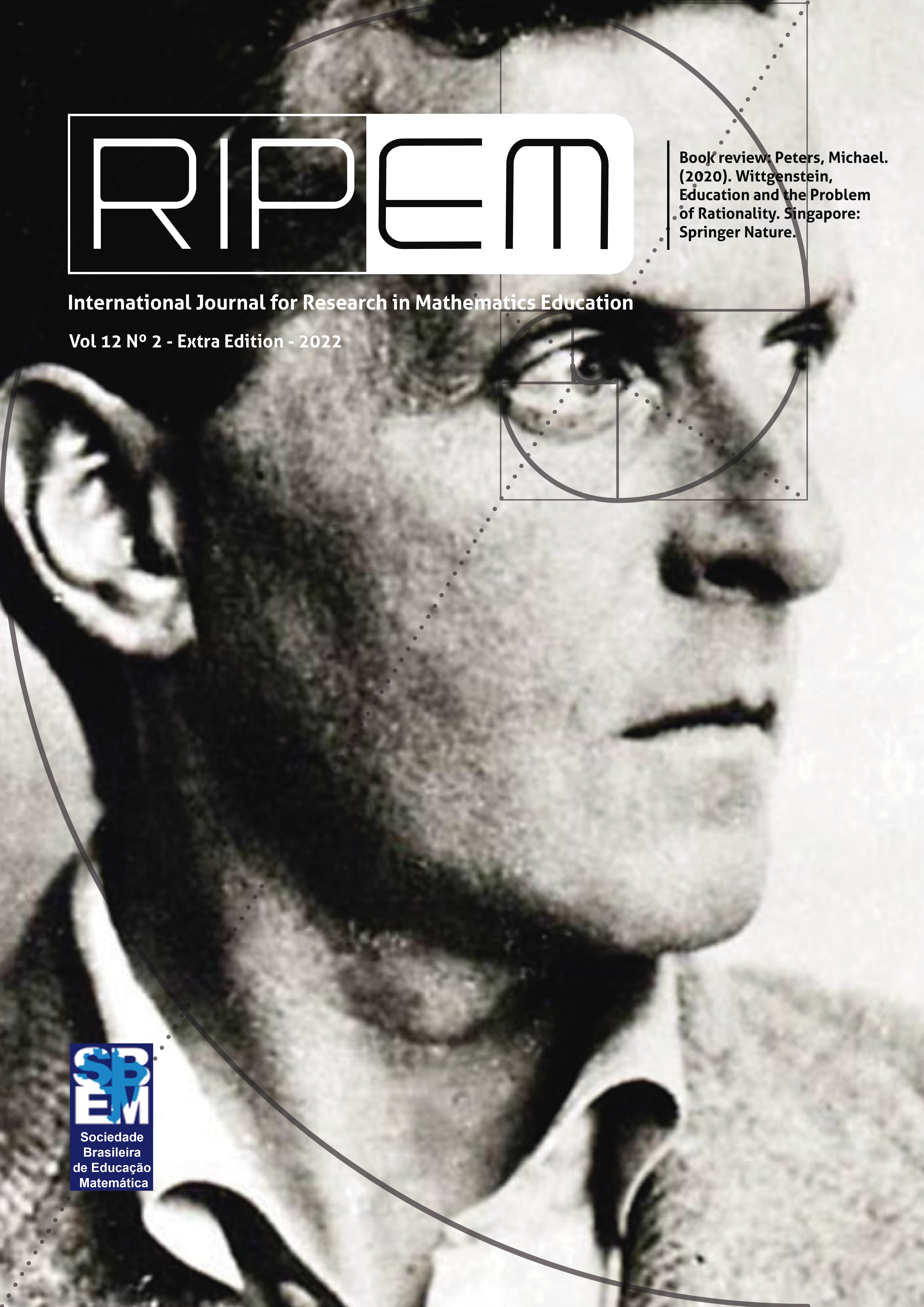Unfounded foundations, grammatical relativism and Wittgenstein, the educator
DOI:
https://doi.org/10.37001/ripem.v12i2.2824Palavras-chave:
The Later Wittgenstein, Philosophy of Education, Grammatical Description, Grammatical Relativism, AntidogmatismResumo
This is a critical review of Michael Peters' book, Wittgenstein, Education and the Problem of Rationality, in which I focus on the following assumptions in order to problematize them: Wittgenstein's supposed relativism and anti-foundationalism; his status as the leading representative of analytic philosophy; and the absence of mention in Peter’s book of the publication of Wittgenstein’s spelling dictionary in 1926, after a period in which he became a primary school teacher. The philosopher's preface to this dictionary, in my view, contains some evidence that may have led him to revise his main theses in the Tractatus, giving rise to a second linguistic turn in his thinking, in which the concepts of "language game", "family resemblances" and "following rules" are forged by him in view of the grammatical description of the uses of problematic philosophical concepts. I argue that this phase of his life as an educator was intrinsically linked to that of the philosopher, leading him to an intermediate position between relativism and dogmatism.
Downloads
Referências
Bartley III, W. (1978) Wittgenstein, une vie. Bruxelas: Presses Universitaires de France: Editions Complexe.
Gottschalk, C. M. C.. (2009) O conceito de compreensão - a mudança de perspectiva de Wittgenstein após uma experiência docente. In: Reunião Anual da Anped, 32. Anais, Caxambu.
Gottschalk, C. M. C.. (2019) A compreensão de outras culturas na perspectiva ética das Observações sobre â€O Ramo Dourado†de Frazer. In: Marques, António & Cadilha, Susana (orgs.) Wittgenstein sobre Ética. Lisboa: Universidade Nova de Lisboa Faculdade de Ciências Sociais e Humanas IFILNOVA — Instituto de Filosofia da Nova, pp. 68-89.
Gottschalk, C.M.C. (2020a) Uma reflexão sobre o sentido linguÃstico rumo a uma pedagogia de inspiração wittgensteiniana. Revista Educação e Realidade, vol. 45, nº 3.
Gottschalk, C.M.C. (2020b) A Persuasão como Estratégia de Ensino. In: A Escola: Problema Filosófico. Mendonça, S. & Gallo s. (orgs.) São Paulo: Parábola, pp.106-123.
Hamlyn, D. W. (1989) “Education and Wittgenstein’s Philosophyâ€. Journal of Philosophy of Education, vol. 223, no. 2.
Hübner, A. (1977). Preface to Ludwig Wittgenstein's Dictionary for Elementary Schools. In: Wittgenstein, L. Wörterbuch für Volksschulen. Wien: Verlag Hölder-Pichler-Tempsky.
Menger, Karl. (1994) Reminiscences of the Vienna Circle and the Mathematical Colloquium. London: Kluwer Academic Publishers.
Monk, Ray. (1995) Wittgenstein - o dever do gênio. São Paulo: Companhia das Letras.
Moreno, A. (2000). Wittgenstein, os labirintos da linguagem. Campinas:Editora da Unicamp.
Moreno, Arley Ramos. (2019) “Wittgenstein e os valores: do solipsismo à intersubjetividadeâ€. In: Marques, António & Cadilha, Susana (orgs.) Wittgenstein sobre Ética. Lisboa: Universidade Nova de Lisboa Faculdade de Ciências Sociais e Humanas IFILNOVA — Instituto de Filosofia da Nova.
Oliveira, Paulo. (2019) “Epistemologia do traduzir; normas de uso e sua descrição a parte post.†Gragoatá, Niterói, v.24, n. 49, p. 572-596, mai.-set..
Oliveira, Paulo. (2020) “Prefácio do dicionário para escolas primárias: comentário introdutórioâ€. In: Gottschalk, C. M. C. (org.). Ensaios filosóficos-educacionais de uma perspectiva wittgensteiniana. Jundiaà [SP]: Paco Editorial.
Peters, Michael A. & Stickney, Jeff. (2017) A Companion to Wittgenstein on Education Pedagogical Investigations (ebook). Singapore: Springer.
Peters, Michael A. (2020) Wittgenstein, Education and the Problem of Rationality. Singapore: Springer Nature Singapore Pte Ltd.
Reis, Maria Fernanda de Moura. (2010) O Dicionário para escolas primárias de Ludwig Wittgenstein e a virada linguÃstica. Dissertação de mestrado. FEUSP.
Stern, David G.. (1991) “Heraclitus’ and Wittgenstein’s River Images: stepping twice into the same riverâ€. The Monist, La Salle, pp. 579-604.
Winch, P. (2003)The Idea of a Social Science and its Relation to Philosophy — Second Edition. London: Routledge.
Wittgenstein, L. (1981) Zettel.São Paulo: Edições 70.
Wittgenstein, L. (1988) Les Cours de Cambridge (1930-1932). Translation of the English edition: Wittgenstein’s Lectures; Cambridge, (1930-1932). Basil Blackwell, Oxford.
Wittgenstein, L. (1998) Remarks on the Philosophy of Psychology/Bemerkungen Ãœber die Philosophie der Psychologie. Oxford: Basil Blackwell Oxford.
Wittgenstein, L. (2009) Philosophical Investigations. Revised fourth edition by P. M. S. Hacker and Joachim Schulte. Wiley-Blackwell.
Wittgenstein, L. (2012) On Certainty. São Paulo: Edições 70.
Publicado
Como Citar
Edição
Seção

Este trabalho está licensiado sob uma licença Creative Commons Attribution-NonCommercial-NoDerivatives 4.0 International License.








